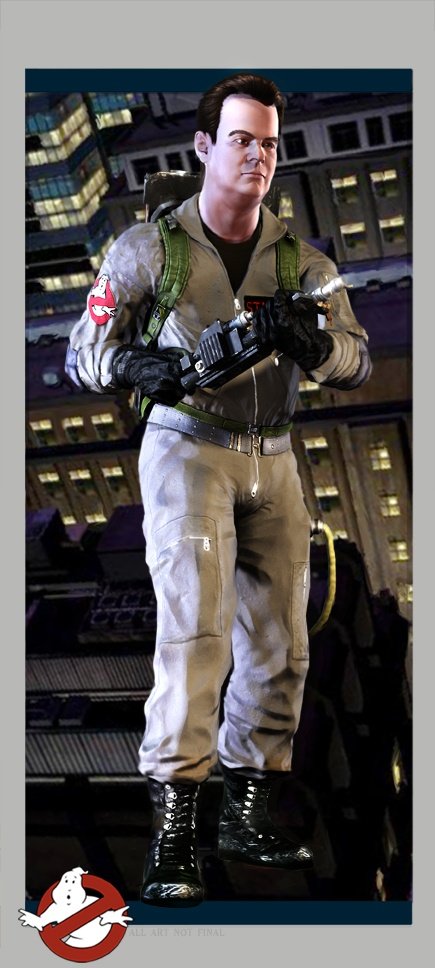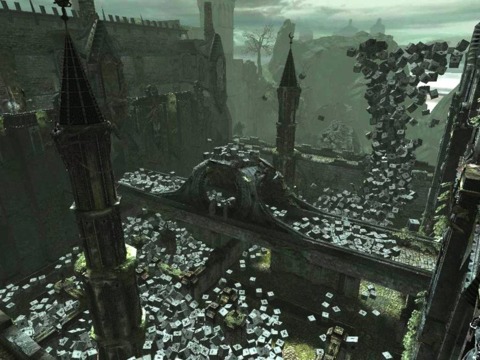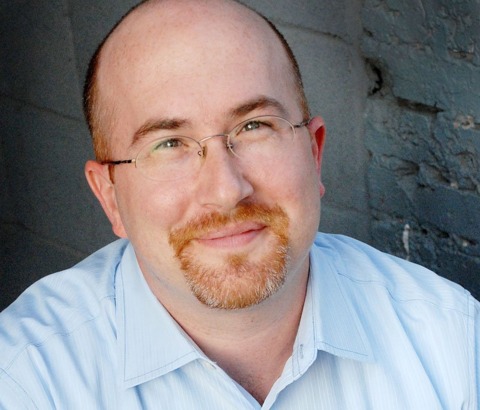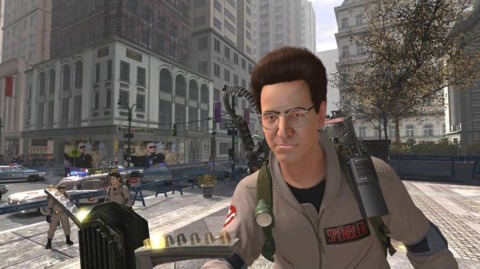Q&A: Ghostbustin' with Terminal Reality
VP of marketing Joe Kreiner talks about the licensed game's long road to release and the Texas studio's plans for stoking interest in its Infernal Engine.
At last week's 2009 Game Developers Conference, hundreds of developers were on hand to tout their wares and services. One was Terminal Reality, best known during the last console generation for its vampiric action series BloodRayne, which was subsequently made into two critically pilloried films by Uwe Boll.
Luckily, Terminal Reality's first foray on current-generation consoles has a much more auspicious origin. The company is currently putting the finishing touches on Ghostbusters, based on the eponymous 1984 supernatural comedy classic starring Dan Aykroyd, Harold Ramis, and Bill Murray. All three actors are lending their voices and likenesses to the game.
After an unsanctioned attempt by Slovenian studio ZootFly, the game adaptation was brought to Terminal Reality by Vivendi Games subsidiary Sierra Entertainment. There it gestated until last summer, when Vivendi merged with Activision--and the new company, Activision Blizzard, announced that it had no plans to publish Ghostbusters. Luckily, the newly privatized Atari stepped into the breach, agreeing to publish the game last November.
So how exactly did Atari pick up Ghostbusters? Why did Activision get rid of it? And how is Terminal Reality's attempt to market its middleware suite, the Infernal Engine, going in a space dominated by Epic Games' Unreal Engine--and threatened by a worldwide econopocalypse? GameSpot chatted with Terminal Reality vice president of sales and marketing Joe Kreiner to find out.
GHOSTBUSTERS
GameSpot: So it's been a long time coming, but Ghostbusters is finally coming out. It's still on track to ship on June 16, correct?
Joe Kreiner: It is, yes.
GS: Cool. Now, this is developed top to bottom with Terminal Reality's Infernal Engine, right?
JK: Yeah, that's correct. Ghostbusters: The Video Game is the tool we're going to use to show off what the Infernal Engine's capable of. We feel when that comes out--it gives us a showcase to really demonstrate the capabilities of the Engine, the Velocity Physics Engine that we include inside of Infernal, which is developed in-house.
Ghostbusters has some really realistic environments. It's all about the cool destruction [that] Ghostbusters the movie was about--the Ghostbusters running into the Sedgwick Hotel and breaking the place up and causing mass chaos.
GS: And slime, don't forget slime.
JK: Yeah, exactly, getting slimed. [Laughs] And all that's in the video game. We designed the Velocity Physics Engine essentially around those needs, and then adapted it to using it as a licensed solution. We feel it's very flexible and just adds some really cool realism that we haven't seen in video games yet.
GS: Well, let's start at the beginning of the whole Ghostbusters saga because this is an interesting story, especially its angled origin. Now, a demo for a Ghostbusters game was done by a Slovenian studio called ZootFly, right? That has nothing to do with [PlayStation 2 and Wii developer] Red Fly, right?
JK: No.
GS: OK then. So those guys came up with their own demo thing based on Ghostbusters, and then Terminal Reality and Red Fly took it over?
JK: No. The ZootFly thing was separate. I really don't know much about those guys, or what they were working on. But we were approached by [now-defunct Vivendi label] Sierra [Entertainment] to do Ghostbusters.

GS: So you were approached by Sierra to do Ghostbusters? Because we got the information outside the usual PR food chain, since Dan Aykroyd likes to speak to Canadian media outlets.
JK: So the way it worked is we were talking to Sierra, not only to show them the Infernal Engine and what it was capable of, but pitching them on a project that they ended up not picking up. But once they saw the physics engine that we have in the Infernal Engine, and the technology that we had, they thought that Ghostbusters would be a great fit and offered it to us. And, of course, everyone here at Terminal Reality is a big Ghostbusters fan. So we were elated to be able to work on the franchise.
GS: Yeah, I mean it's a marquee franchise, especially with the whole Gen-X nostalgia thing. So Red Fly--and just to make it clear, you guys don't own Red Fly--they're doing part of the development just on a Wii version of it?
JK: Yes, Red Fly is a licensee of the Infernal Engine. So they have access to our technology. And they are doing the Wii and the PlayStation 2 version of Ghostbusters.
GS: And you've also enlisted all the major cast members besides Sigourney Weaver, correct?
JK: Yeah, that's correct. The original cast is all on the video game. They were very influential in the development, including the script. The voice acting in Ghostbusters is unique in that it really gives you the feel of the movies and the comedy style of the original.
GS: Well, Harold Ramis cowrote it, right?
JK: Yeah.
GS: How involved were Ramis, Aykroyd, and Murray in the game-design process? Did they give you any ideas for any missions or whatnot, or did they just show up and read their lines? I mean, I can't imagine Bill Murray being a big gamer, but maybe he is...
JK: [Laughs] Yeah, the original cast was really influential in the design. I mean, they were with us from day one on the story, and the way the video game should be developed, and provided an amazing amount of voice acting for us. I've got to say that the amount of talent that's gone into Ghostbusters: The Game is probably an unprecedented effort from the original cast.
THE ROAD TO ATARI
GS: Now, people have been really looking forward to Ghostbusters ever since it was announced, myself included. So many people were disappointed when it was announced that following the Activision-Vivendi union, Activision Blizzard would not be publishing your game. When did you guys first learn of that development?
JK: We knew about it relatively quickly after the announcement of the merger.
GS: I can imagine.
JK: It was a choice on Activision's part. I think Bobby Kotick came out and said that it just didn't fit the business model they were looking for.
GS: So it didn't involve Guitar Hero or Call of Duty, eh?
JK: Well, they're looking for titles that they can continue to franchise year-over-year. And to be honest, we really feel that Ghostbusters is one of those titles.
GS: It could even be made into a movie or animated TV series...
JK: Yes. Anyway, we're really excited that Atari picked it up. And I think [Atari president] Phil Harrison is on the record for saying he's going to try to prove Activision wrong. And I think we've got a great shot. Ghostbusters looks phenomenal. We're all very excited about it coming out.
GS: So you mentioned Phil Harrison. So once you guys were jilted, for lack of a better term, who approached whom? Did Atari approach you, or were you negotiating with a bunch of other publishers and they just made you the best offer? How exactly did the deal come about?
JK: Yeah, I wouldn't call it "jilted." Like I said, Activision just decided it didn't fit in the model they wanted. They were shopping it around with the other publishers...
GS: Activision was?
JK: Activision was, yeah, because they were the ones handling those discussions with all the other publishers. It just so happened that Atari won those battles.
GS: Apparently. So now, working for Atari--they've gone through a tumultuous self-reinvention themselves. What's it been like working with this new model, their whole new organizational structure?
JK: It's been great. I've got to say Phil Harrison's created a new Atari that's got a lot of energy and a new direction. And we're really excited about it. I think Ghostbusters: The Game is going to be a centerpiece for them for this year and reestablish them as a highly successful publisher.
INFERNAL ENGINE
GS: So what's the biggest challenge in marketing and launching Terminal Reality's Infernal Engine? I mean, let's face it, the middleware market is pretty much dominated by Epic Games' Unreal Engine.
JK: I think our biggest challenge is establishing the fact that we're a viable alternative to the other engines out there. The focus of our marketing is to show the world that the Infernal Engine is a complete solution, providing all the visual fidelity of the other engines that are out there. We include our own physics engine, which is a big differentiator.
We're also a lot more cross-platform than the other engines. And I think that's going to help us a lot. We have a really robust Wii solution that a lot of other companies don't have.

GS: Do you foresee Infernal's Wii toolset as being one of your big advantages?
JK: Yeah, absolutely. I think, on the Wii platform, there are a lot of engines available. But I think the Infernal Engine has got the visual fidelity beat as far as the other solutions out there. We provide a lot of lighting and multitexturing that you just don't see with the other engines. And it really brings the Wii visually pretty close to the next-gen platforms, which we think is fantastic.
The Ghostbusters Wii version that's being done at Red Fly, I think when that comes out, will really show the world what the Infernal Engine is capable of on the platform. Mushroom Men: The Spore Wars, which SouthPeak used it for, has already shipped on Wii as well. That got a lot of critical praise for its graphics.
GS: OK. So we've got Ghostbusters. We've got Mushroom Men. How many other titles are either out or in the pipeline that use the Infernal Engine?
JK: On the Wii side, we've got probably a half-dozen plus running in development on the Wii. On next-gen platforms, it's probably about as many. But most of our licensees are using the Infernal Engine for cross-platform use, because it's our strength.
GS: OK, so in terms of partners, you've got Streamline Studios, Wideload Games, Piranha, Escalation Studios, and Threewave Software? Am I missing anyone on that or not?
JK: There's Red Fly and then SpiderMonk, which is a Dallas game developer.
GS: Other than getting the message out, what do you feel your biggest challenge is, going up against the Unreals or the Gamebryos?
JK: The thing about getting into the middleware engine business is that you need to prove to the game developers out there that your technology has a really robust pipeline so they can be efficient in development. You also have to prove it has the visual fidelity and the features that you need, and then has a design methodology that fits in with what people want to use.
We feel because of the engine's cross-platformness, it really fits in with the way game development is being done nowadays. I mean, you cross-collateralize your assets as much as possible. Infernal Engine has got a big bonus there that the developers can reduce their costs, and maybe ship a platform that they wouldn't have otherwise done.
For instance, the Infernal Engine not only supports Wii, but we have great multithreading support for multiple CPU environments. So our solution runs great on the PlayStation 3 as well as the Xbox 360 and the PC. In particular, our PlayStation 3 technology is very strong.
THE FUTURE, JOE?
GS: So other than Ghostbusters and your big plans for the Infernal Engine, what is next for Terminal Reality? Are you going maybe revisit any of your other old franchises like BloodRayne ? What's next for you guys?
JK: Well, obviously, I can't announce anything.
GS: Obviously.
JK: Yeah, I know. It's a bummer, isn't it?
GS: Yeah.
JK: Well, let me say that Terminal Reality is a very large independent game developer. We've been around for 15 years, so we have a ton of our own IP. We've got two game development teams as well as a separate engine licensing team.
So, of course, we'll have new projects in development all the time, of course, none of which I can talk about. But trust me, they'll be exciting.
GS: So you've got two teams. Are they working on two titles?
JK: Yes, that's correct.
GS: OK, so you guys have got this deal with Atari. That's good. But the global econopocalypse is freaking everyone out, including publishers. Have you already secured publishing deals for the two games?
JK: Oh, I can't talk about any of that stuff. But I will put it this way. I know the financial apocalypse has everyone very worried. And I think in a lot of cases, it's made the publishers rethink their strategies.
But for the older independent studios that have a really good track record like Terminal Reality, it really hasn't affected us that much. We still have a lot of potential partners, and we see the publishers are still active in signing up games. They're just being more cautious about how they're deploying their resources.
Another Crab's Treasure Is A Soulslike 3D Platformer | GameSpot Review Stellar Blade Review Nintendo 64 – April 2024 Game Updates – Nintendo Switch Online Super Monkey Ball Banana Rumble - Official Multiplayer Features Trailer PUBG | Erangel Classic Returns Gori: Cuddly Carnage | Meow Launch Date Announcement Trailer Genshin Impact - "Arlecchino: Afterglow of Calamity" | Collected Miscellany Marvel Rivals - Official Loki Character Reveal Trailer | The King of Yggsgard Fortnite Festival - Official Billie Eilish Cinematic Season 3 Trailer Remnant 2 - The Forgotten Kingdom | DLC Launch Trailer Stellar Blade - Official "The Journey: Part 2" Behind The Scenes Trailer | PS5 Games Dead by Daylight | Tome 19: Splendor | Reveal Trailer
Please enter your date of birth to view this video
By clicking 'enter', you agree to GameSpot's
Terms of Use and Privacy Policy
Got a news tip or want to contact us directly? Email news@gamespot.com


Join the conversation